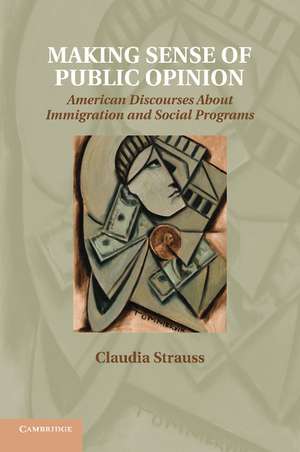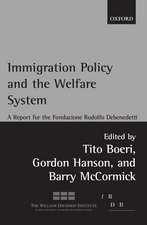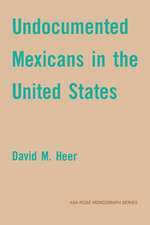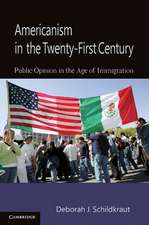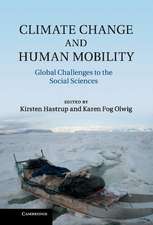Making Sense of Public Opinion: American Discourses about Immigration and Social Programs
Autor Claudia Straussen Limba Engleză Paperback – 22 ian 2014
| Toate formatele și edițiile | Preț | Express |
|---|---|---|
| Paperback (1) | 432.17 lei 43-57 zile | |
| Cambridge University Press – 22 ian 2014 | 432.17 lei 43-57 zile | |
| Hardback (1) | 758.35 lei 43-57 zile | |
| Cambridge University Press – 14 oct 2012 | 758.35 lei 43-57 zile |
Preț: 432.17 lei
Nou
Puncte Express: 648
Preț estimativ în valută:
82.70€ • 85.86$ • 68.96£
82.70€ • 85.86$ • 68.96£
Carte tipărită la comandă
Livrare economică 24 martie-07 aprilie
Preluare comenzi: 021 569.72.76
Specificații
ISBN-13: 9781107688698
ISBN-10: 1107688698
Pagini: 454
Ilustrații: 14 b/w illus. 11 tables
Dimensiuni: 153 x 228 x 24 mm
Greutate: 0.6 kg
Editura: Cambridge University Press
Colecția Cambridge University Press
Locul publicării:New York, United States
ISBN-10: 1107688698
Pagini: 454
Ilustrații: 14 b/w illus. 11 tables
Dimensiuni: 153 x 228 x 24 mm
Greutate: 0.6 kg
Editura: Cambridge University Press
Colecția Cambridge University Press
Locul publicării:New York, United States
Cuprins
Part I. Overview: 1. Conventional discourses, public opinion, and political culture; 2. Analysis of conventional discourses: backgrounds and methods; 3. Conventional discourses and personal lives; Part II. Immigration: 4. Public opinion about immigration; 5. 'Too many immigrants' and discourses about economic costs and benefits; 6. Discourses about legality, illegality, and national security; 7. Discourses about immigration and American culture; 8. Discourses about immigration causes and contexts; Part III. Social Welfare Programs: 9. Public opinion about social welfare programs; 10. Discourses about limitations of government programs; 11. Discourses about personal responsibility and benefits for the deserving; 12. Discourses about caring for self, family, community, and nation; 13. Discourses about social causes of economic insecurity; Part IV. Conclusion: 14. Questions and implications.
Recenzii
'Claudia Strauss's new book resolves one of the central mysteries of public opinion: how can Americans hold contradictory views on salient issues like immigration? She uses the trope of conventional discourse to reveal the complexity of thinking that lies behind the simplistic renderings of public opinion that are too often extracted from surveys. The book is required reading for anyone who wants to think seriously about public opinion and the politics of policy options.' Richard Alba, City University of New York
'Claudia Strauss provides a thorough discussion of the various immigration and social welfare discourses that shape public opinion. She shows convincingly that people draw on wide-ranging conventional discourses that they hear and read about in their daily lives, often resulting in seemingly contradictory positions held at the same time. A must-read for anyone interested in how public opinion is formed and how individuals chose among competing views on such important issues as immigration and social welfare.' Leo Chavez, University of California, Irvine
'Scholars, pundits, and politicians have tried for decades to understand how people come to hold political opinions and preferences, why different people hold distinct views, and whether such views can be changed. I thought that I had read every conceivable explanation - ranging from deeply felt ideologies to apparently trivial variations in surveys' question wording, and everything in between. But here is an innovative and exciting explanation; Claudia Strauss's conception of conventional discourses cuts through an amazing amount of chatter and gives a new perspective on what citizens say, believe, and fear.' Jennifer Hochschild, Harvard University
'Claudia Strauss provides a thorough discussion of the various immigration and social welfare discourses that shape public opinion. She shows convincingly that people draw on wide-ranging conventional discourses that they hear and read about in their daily lives, often resulting in seemingly contradictory positions held at the same time. A must-read for anyone interested in how public opinion is formed and how individuals chose among competing views on such important issues as immigration and social welfare.' Leo Chavez, University of California, Irvine
'Scholars, pundits, and politicians have tried for decades to understand how people come to hold political opinions and preferences, why different people hold distinct views, and whether such views can be changed. I thought that I had read every conceivable explanation - ranging from deeply felt ideologies to apparently trivial variations in surveys' question wording, and everything in between. But here is an innovative and exciting explanation; Claudia Strauss's conception of conventional discourses cuts through an amazing amount of chatter and gives a new perspective on what citizens say, believe, and fear.' Jennifer Hochschild, Harvard University
Notă biografică
Descriere
This book proposes that Americans form views on immigration and social welfare programs from conventional ways of speaking rather than from ideologies.
